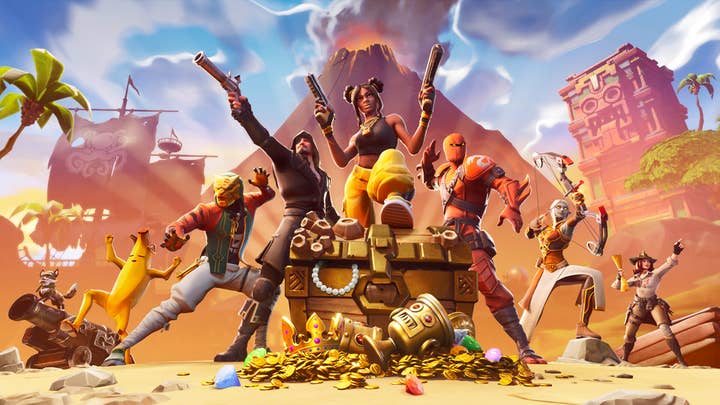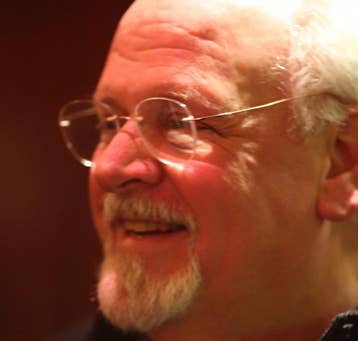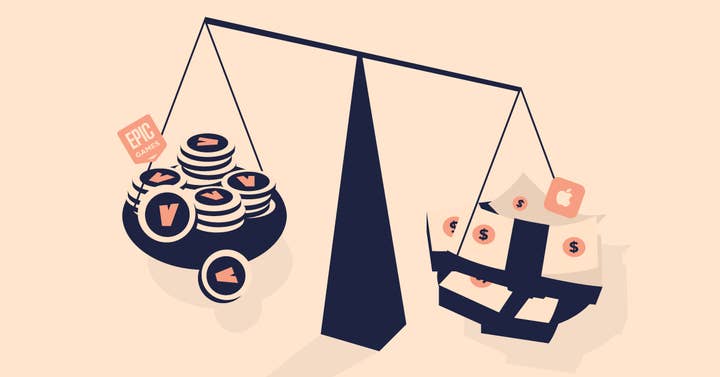Epic vs Apple - Week One In Review: Epic still faces an "uphill battle"
Legal experts share their thoughts on the proceedings so far, and what to expect from the coming week
We're more than a third of a way into the long-awaited Epic vs Apple antitrust trial, but there's still no indication as to where the gavel may fall when the case comes to a close.
GamesIndustry.biz spoke to legal experts who specialise in this field to get more insight into what we have learned so far, how well each party is putting forward their argument, and what we might expect as the focus shifts from Epic to Apple.
The opening week has concentrated on Epic as the plaintiff putting forward its case. Apple has been allowed some cross-examination of witnesses, but it won't be until later this week that it steps up its defence.
Richard Hoeg, managing partner of Michigan-based The Hoeg Firm, says that both Apple and Epic "strongly represented" their views of what the former has done with iOS as an ecosystem.

"Where Epic describes the iOS and App Store as 'the plan' to lure in developers and users alike with conveniences and other benefits before locking them into their 'walled garden', Apple, of course, frames the exact same behaviour as offering benefits and opportunity to consumer and developer alike," he says.
"This is one of the fundamental difficulties with evaluating antitrust actions, as very, very competitive behaviour -- which wins market share though business acumen -- can look very similar to anti-competitive behavior."
Key to Epic's argument is that 30% commission fee it attempted to avoid with Fortnite -- something Apple insists is necessary to support their operations like security and app review and approval processes.
Thomas Buscaglia, who runs law firm The Game Attorney, says: "[Apple's] efforts to lay the groundwork for this argument through Epic's witnesses have not gone well so far in week one of the trial. Of course, their case in chief, where they get to call their witness and present their case will not commence until later this week."
Among other things, Epic has also highlighted Apple's treatment of different apps and games (such as how it treats Fortnite compared to Roblox), as well as questioning Apple's App Review process and how effective its security protocols are -- protocols that Epic itself circumnavigated with the direct payment hotfix that started all this.
"At times, it seems like Apple's counsel have been helping Epic up that hill"
Thomas Buscaglia, The Game Attorney
Hoeg says these have been "some successful avenues of attack," but adds: "Much like a sporting event where one side gets to be on offense while the other plays defense, Epic needs to build a strong foundation in this portion of the trial, and certainly Apple has been doing an effective job of poking holes."
Buscaglia also notes Epic "has an uphill battle," but adds: "At times, it seems like Apple's counsel have been helping Epic up that hill."
Epic vs Apple is a bench trial in which the judge also acts as the fact finder, meaning they can interrupt examinations and ask witnesses some questions of their own. Buscaglia points to Judge Yvonne Gonzales Rogers doing just that in an example of "Apple slinging mud [at Epic] and getting it all over themselves in the process."
The exchange he refers to centred around a cross-examination of Epic Games Store's vice president and general manager Steve Allison, in which Apple's lawyer attempted to get Epic to admit it allowed sexualised and offensive content on its store through its recent partnership with Itchi.io.
Rogers interrupted with a few direct questions of her own, leading Allison to clarify and explain that Epic Games Store does not distribute games from Itchi.io -- only the Itch.io app store. And while Epic Games Store distributes that app store on PC, Allison said: "I don't know that we would want to do that [on a phone]."
"I don't know what Apple's lawyer was thinking," says Buscaglia. "But they sure missed making any points with this lame argument and lost credibility in the process. It also shows that Judge Rogers is sharp and not moved by bad arguments or impressed by sloppy 'gotcha' questions."

That's not to say Judge Rogers appears to be favouring Epic in how this case is being handled. Hoeg points to the court's "continued irritation" with how documents and other case information has been leaked, seemingly accidentally, in the early days of the trial.
"It's difficult to frame the effect of that on either the court or the parties, but as we are presently in Epic's phase of the case, the judge does appear to be holding this and other procedural issues against Epic a bit more than Apple," he says.

"Since part of Apple's case appears to be to frame Epic as a 'wildcard' bad actor that can't be trusted, suffice it to say Epic should really be working to make sure all 'I's are dotted and 'T's are crossed on future procedural questions."
Much of this week has been spent defining what a relevant marketplace is, something that will be key to the outcome of this case. Buscaglia expects Epic to continue focusing on US market share, since Apple devices account for "a huge percentage of the [mobile] market." Apple, on the other hand, is likely to try to keep the conversation more global, since Android devices hold a much larger market share -- over 86% as opposed to less than 50% in the US.
But, he points out, this is a US antitrust trial, and "US law applies to the US markets because that's where US consumers live."
Epic is also taking on both Apple and Google in Europe, the UK and Australia, although its case against Apple in the UK has been blocked and no other trials have been scheduled yet.
Part of this market definition conversation has been establishing the difference between a mobile ecosystem and that of a console, with several comparisons to Xbox brought up after Epic called Microsoft as a witness.
"I think Lori Wright of Microsoft's testimony was perhaps the most interesting," says Hoeg, "as Epic attempted to establish that PC and consoles were entirely distinct from phones, while Apple attempted to poke holes in that logic."
Apple has since done more than poke holes, even questioning the credibility of Wright's testimony and calling for the courts to further investigate the alleged lack of relevant documents that would back up her claims of Xbox's unprofitability.
"If 'a hardware manufacturer that controls access to the software that runs the hardware' is a monopolist by law, then ALL of the console manufacturers might have problems"
Richard Hoeg, The Hoeg Law Firm
"This line of discussion also dovetailed with the question of what effect an Epic win might have on the overall landscape," Hoeg continues, "because if 'a hardware manufacturer that controls access to the software that runs the hardware' is a monopolist by law, then all of the console manufacturers might well have problems; an issue that became all the more pertinent when Sony was sued for behavior as a 'monopolist' of its store access on the very same day."
Hoeg's comments echo Rogers' warning from last year that this case could have "serious ramifications" for Xbox, PlayStation and Nintendo.
Alongside the definitions of marketplaces and single-purpose vs general-purpose devices, the definition of what even can be considered a game has come into question. Epic CEO Tim Sweeney positioned Fortnite as a metaverse and an "phenomenon that transcends gaming," while Apple executive Trystan Kosmynka attempted to explain why the mobile giant treated Fortnite differently to Roblox, describing its user-built games as "content."
"If you think of a game or app, games are incredibly dynamic," he said. "Games have a beginning and end, there's challenges in place. I look at the experiences that are in Roblox similar to the experiences in Minecraft."
For Buscaglia, this was "some of the dumbest testimony" so far, adding: "Their definition of what a game is was laughable in today's world, trying to distinguish 'games' from 'experiences'.
He continues: "[Kosmynka's definition is] sophistry at it's best -- although I am not too sure that Tim Sweeney's 'metaverse' hit the mark either. But, at least that position does not damage Epic's position."

There are still just under two weeks to go, and both experts agree Epic has quite the battle on its hands if it hopes to prevail. Hoeg says that, from the beginning, Apple has easily had the strongest case based on historical uses of antitrust and competition legislation.
"If you dare sue Apple, you would end up locked out of the App Store. So, they don't care. That sure looks like monopoly power at work"
Thomas Buscaglia, The Game Attorney
"They are the creators of the hardware at issue and US law has long been reluctant to find a monopoly market in the offering of a single product," he explains. "Otherwise, every individual or entity that 'creates' could be said to have a monopoly in access to their own creation.
"That said, historical use is not everything, and we can see across the globe and in various governments of all sizes a re-examination of just what tech companies actually do whether through their hardware or otherwise. Epic has selected this specific point in time with intelligence, as this likely represents one of the best possibilities for a win on their theory of the case."
He adds: "After this first week, I think things are pretty much where they were before the trial commenced. Epic has a high hill to climb but is making some good in-roads. The question is are they doing so effectively enough, especially with Apple's formal defense yet to come."
Buscaglia admits he's "a little biased" because his personal experience "certainly does not support Apple's position."
"In my efforts to protect my client's games from being copied and their trademarks infringed, I have filed numerous DMCA notices to Apple, who routinely refuses to remove even the most obvious infringing apps," he explains. "Under the DMCA, Apple is then also liable for the infringement. But if you dare sue Apple, you would end up locked out of the App Store.
"So, they don't care. That sure looks like monopoly power at work. When a company can do wrong but has so much market power that people are simply helpless, that is real harm to developers and consumers."
He concludes: "I've been representing independent developers throughout my 30-year career in our industry and my sentiments are clearly with Tim. I honestly believe he is trying to represent the best interests of developers. Apple has been making huge profits off of content created by app developers on their platform and doing nothing to serve or protect their interests. So, if they get knocked down a peg or two by Epic, that's just fine with me."
You can follow all of our Epic vs Apple coverage here, or read the highlights in our ongoing roundup.

